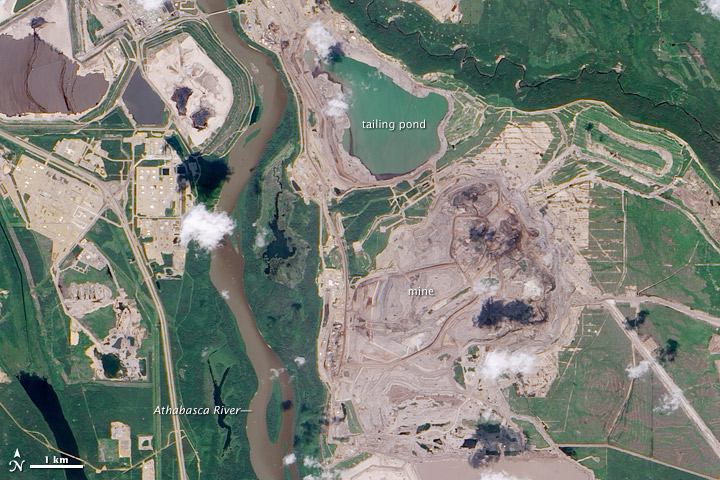"Ethical Oil" Will Still Damage The Environment

The issue, some claim, is that the ads are merely propaganda designed to overshadow concerns about the environmental impact of extracting crude oil from Canadian tar sands. Samples taken from the Athabasca River, whch runs through the extraction site, have shown elevated levels of thirteen heavy metals, including arsenic, lead and mercury, especially around the mining area. Communities downstream from the plants have also experienced increased rates of cancer
However, the oil companies who are drilling have either dismissed the evidence or ignored environmentalists’ claims about the damage resulting from massive amounts of pollutants seeping into the surrounding area. The Canadian government, meanwhile, continues to advocate internationally for the sale and use of tar sands oil.
The reason for the government’s relaxed attitude towards the industry may have something to do with the estimated value of the sands, which is well over one trillion Canadian dollars. They have become part of a propaganda battle between the industry and environmental activists. On its website, Canadian Oil Sands, the largest investor in the oil sand refining company Syncrude, says:
Canadian Oil Sands has two roles in the sustainable development of the oil sands. First, we steward Syncrude to ensure that environmental, social and economic considerations are integrated into its strategy and investment decision making. Second, we contribute to the industry’s efforts to communicate to a wide range of stakeholders the challenges and opportunities around oil sands development as well as industry efforts to balance the need for energy security and economic development with environmental and social responsibility.
Though this statement sounds reasonable, the company has not followed these claims up with any real action. The problem with declarations like this is that they obscure the fact that all corporations concern themselves more with the bottom line than gaining the local population’s affection or protecting the environment. Claims by the company that they have reduced the amount of pollution per barrel of crude produced mean little when they also plan to expand their operations significantly in the next few years. The fact that residents in nearby areas are already experiencing detrimental effects means that the problems will only increase in the years to come.
The saddest part is that the Canadian government cannot resist the temptation, and is now pandering to the oil companies’ whims. This is the average response of governments when money beckons, but it is sad to watch it happen yet again.
Now, the issue has spread south with the construction of the Keystone XL oil pipeline, which will run from the tar sands in Alberta to various refineries in the United States Gulf. While concerns about the initially proposed route of the pipeline—which passed through seismically active areas, the Nebraskan wetland ecosystem known as the Sandhills and the Ogallala Aquifer, one of the world’s largest reserves of fresh water—have been partially addressed by an alteration to avoid the Sandhills, there remain other issues with the pipeline.
The oil company TransCanada had filed excessive eminent domain lawsuits against landowners in Texas and South Dakota, while statistics reflecting the supposed economic benefits of the project may have been inflated. While the claim made by some that this pipeline will singlehandedly destroy the environment is perhaps an overstatement, the fact remains that jobs provided by this endeavor will be temporary, profits will be fleeting and, when all is said and done, an area larger than Alabama will have been transformed from a healthy ecosystem into a strip-mined wasteland.
While it is tempting to think short term and focus only on the immediate benefits of such a project, we must consider long-term effects and realize that other resources from the area, such as fresh water, timber and biodiversity, which will become more and more valuable as time goes on, may be in endangered by the pipeline's construction.
Oil companies have proved themselves time and again to be untrustworthy stewards of the environment, using lies and money to propagate their activities. It is up to consumers to pressure companies and the government to direct their support away from petroleum products. Regardless of whether climate change is real or not, it makes sense to start finding better sources of energy now, while we have time. Worst case scenario, climate change turns out to be a hoax and we end up with stable climate patterns and better technology. The vitriol with which people argue for oil use is beyond me; the future cannot and will not be powered by oil, whether we want it to or not. All we can do is start to prepare for the future now. The Keystone pipeline is a huge step in the wrong direction for people and the planet on which we live.
Reach Contributor Jaspar Abu-Jaber here.



